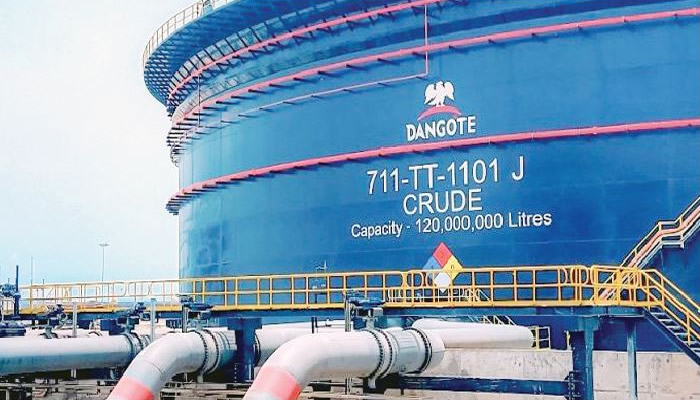The Nigerian Midstream and Downstream Petroleum Regulatory Authority (NMDPRA) has announced that the Dangote Refinery now contributes an average of 20 million litres of refined fuel into the domestic market each day. The regulator hailed the development as a sign that Nigeria’s petroleum sector is gradually shifting toward greater self-sufficiency.
During his address at the Association of Energy Correspondents of Nigeria annual conference in Lagos, NMDPRA’s Chief Executive, Farouk Ahmed, disclosed that the 650,000 barrels-per-day refinery is altering supply dynamics in the country. He said the 20 million litres figure reflects production currently available for the local market under “normal operating conditions,” while acknowledging there is still room for increase as the facility matures.

Ahmed’s remarks came amid ongoing debates over refined product supply and import dependence. He stressed that the daily deliverable output of Dangote is an encouraging milestone—not yet full capacity but a clear proof of progress. The regulator underscored that it will continue to monitor throughput and quality to ensure that the fuel entering the market meets required standards and distribution transparency.
He reminded stakeholders that Nigeria’s total daily fuel demand is estimated to be significantly higher, pointing out that while Dangote’s output eases pressure on imports, it cannot yet fill the entire gap. He called for concurrent improvements in logistics, storage, and downstream infrastructure to ensure that refined fuel actually reaches consumers across all regions.
Ahmed also urged the government to activate and maintain a strategic petroleum product stock, which would provide a buffer during supply shocks or logistical disruptions. He said such a reserve is essential for ensuring resilience in the downstream sector, particularly given the volatility of crude supply and the risks of pipeline vandalism or transportation bottlenecks.
He emphasized that NMDPRA would focus on improving licensing, depot operations, and stricter surveillance of product movement in the supply chain. The regulator intends to clamp down on hoarding, adulteration, and diversion, which he said undermine the gains being made in domestic refining.
In his presentation, Ahmed framed the Dangote Refinery as a central component of Nigeria’s energy future—one that can help shift the nation from dependence on imported petroleum to a more balanced, resilient local supply ecosystem. However, he cautioned that refining alone is not enough. He called for strengthening of distribution networks, cooperation among regulators and operators, and consistent policy support to cement gains.
Some earlier reports, however, cast doubt on the 20 million litres claim. In April 2025, NMDPRA had publicly challenged Dangote’s claims of higher output, suggesting the refinery’s actual premium motor spirit (PMS) supply stood closer to 18 million litres daily, a figure the regulator said it verified through downstream metrics. That pushback heightened scrutiny over official output figures, with observers stressing the need for independent auditing and transparent data disclosures.
The new 20 million litres figure is lower than earlier forecasts that projected Dangote would soon supply 25 million litres daily and scale further thereafter. The expectation at one time was that by late 2024, the facility would reach that level before moving toward 30 million litres daily. The fact that the current output is below those projections suggests that scaling is still gradual and constrained by upstream and logistical challenges.
Even with constraints, many industry watchers say that the reported output is still a landmark milestone. It signals that the refinery is steadily establishing its credibility in local supply and that its operationalization is having tangible impact. Some analysts believe that once crude supply, pipeline integrity, storage, and distribution systems are strengthened, Dangote could progressively increase output toward its design potential.
Conversely, skeptics argue that while Dangote’s output is improving, price, access, and export ambitions could still undermine the refinery’s domestic impact. They note that if refined products are diverted for export or sold at premium margins, local markets may not fully benefit from the increased production.
Currently, Dangote has already taken steps to lift more crude cargoes and reduce reliance on imports, signaling a broader strategy to internalize petroleum value chains. The company also recently withdrew a lawsuit challenging fuel import licensing, which had called into question state regulators’ issuance of import permits while local refining was ramping up. This legal repositioning aligns with the narrative of consolidating domestic refining gains.
Notably, Dangote recently suspended the sale of petrol in naira under its crude-for-naira swap agreement, citing pressures on crude allocations and the mismatch between export and domestic sales. This decision has raised questions about the balance between export ambitions and fulfilling domestic obligations. Thus, even as output improves, governance of supply allocation and pricing remains highly delicate.
As the industry watches, the upcoming months will reveal whether Dangote can maintain, increase, and sustainably deliver produced volumes to filling stations across Nigeria. With strong regulatory oversight and supportive policy, the 20 million litres mark could become a foundation from which Nigeria moves toward full refining sufficiency, reducing import dependence and preserving foreign exchange.
If sustained, this level of output could translate into billions of naira in import substitution, reduced pressure on the national foreign exchange, and greater confidence in local petroleum infrastructure. But much depends on whether downstream capacity—pipelines, depots, transport, terminals—keeps pace with refining gains.
The journey ahead remains challenging, but the disclosure by NMDPRA that Dangote now delivers 20 million litres daily marks an important chapter in Nigeria’s pursuit of energy independence and domestic refining viability.
Support InfoStride News' Credible Journalism: Only credible journalism can guarantee a fair, accountable and transparent society, including democracy and government. It involves a lot of efforts and money. We need your support. Click here to Donate
